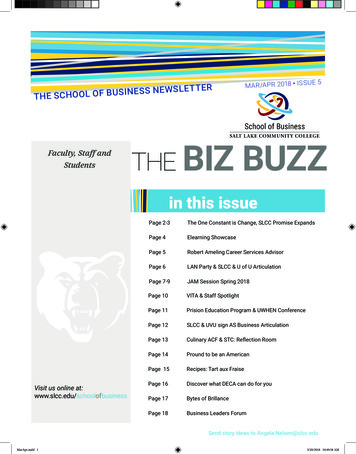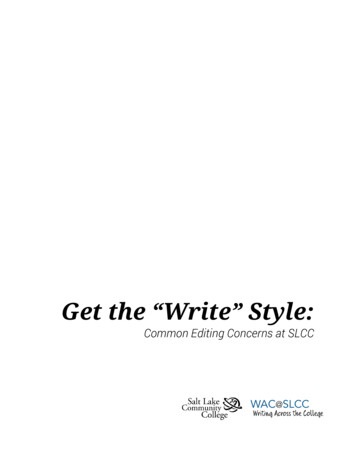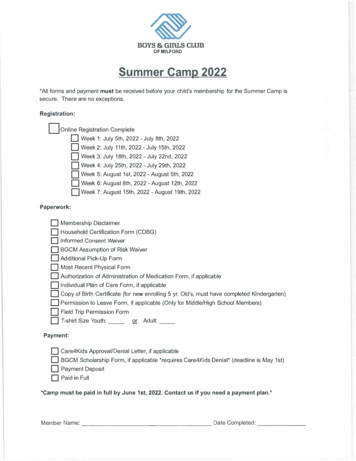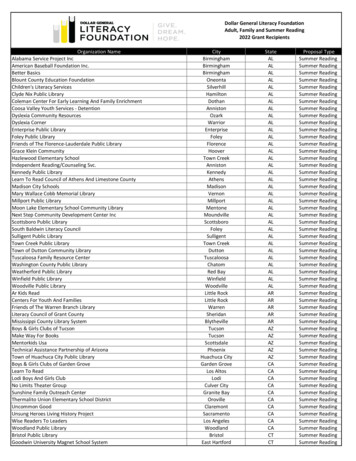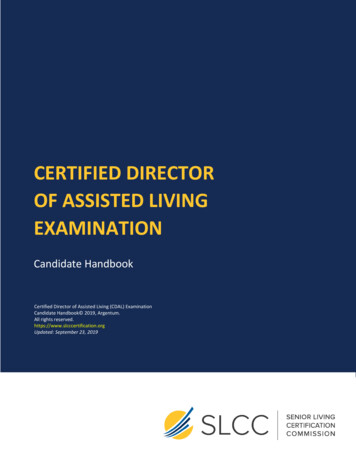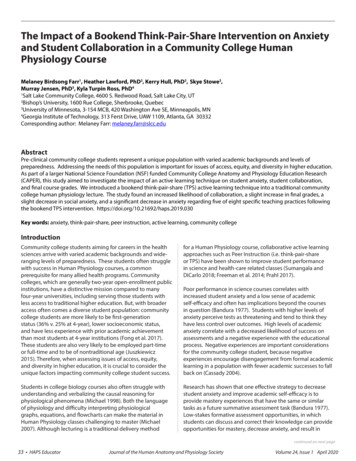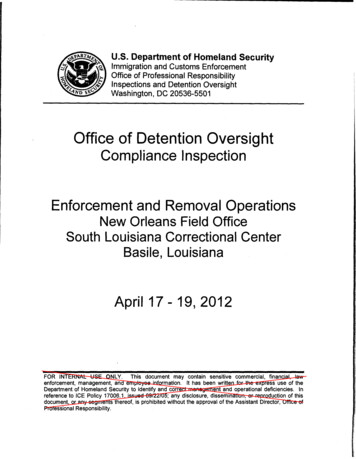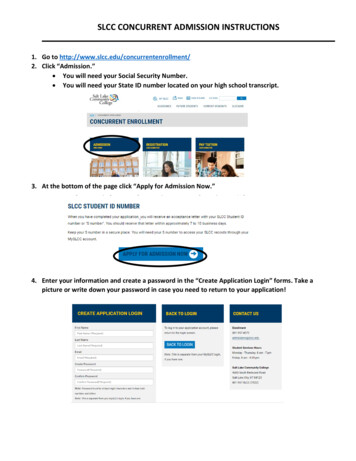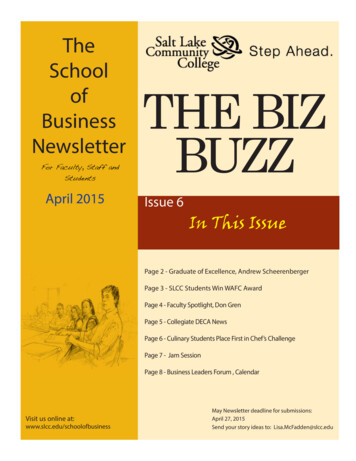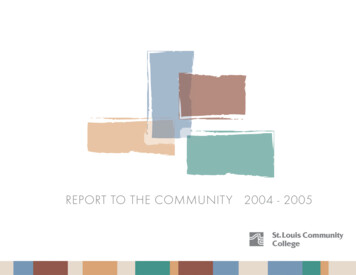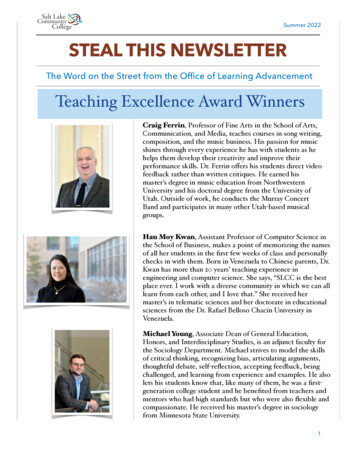
Transcription
Summer 2022STEAL THIS NEWSLETTERThe Word on the Street from the Office of Learning AdvancementTeaching Excellence Award WinnersCraig Ferrin, Professor of Fine Arts in the School of Arts,Communication, and Media, teaches courses in song writing,composition, and the music business. His passion for musicshines through every experience he has with students as hehelps them develop their creativity and improve theirperformance skills. Dr. Ferrin offers his students direct videofeedback rather than written critiques. He earned hismaster’s degree in music education from NorthwesternUniversity and his doctoral degree from the University ofUtah. Outside of work, he conducts the Murray ConcertBand and participates in many other Utah-based musicalgroups.Hau Moy Kwan, Assistant Professor of Computer Science inthe School of Business, makes a point of memorizing the namesof all her students in the first few weeks of class and personallychecks in with them. Born in Venezuela to Chinese parents, Dr.Kwan has more than 20 years’ teaching experience inengineering and computer science. She says, “SLCC is the bestplace ever. I work with a diverse community in which we can alllearn from each other, and I love that.” She received hermaster’s in telematic sciences and her doctorate in educationalsciences from the Dr. Rafael Belloso Chacín University inVenezuela.Michael Young, Associate Dean of General Education,Honors, and Interdisciplinary Studies, is an adjunct faculty forthe Sociology Department. Michael strives to model the skillsof critical thinking, recognizing bias, articulating arguments,thoughtful debate, self-reflection, accepting feedback, beingchallenged, and learning from experience and examples. He alsolets his students know that, like many of them, he was a firstgeneration college student and he benefited from teachers andmentors who had high standards but who were also flexible andcompassionate. He received his master’s degree in sociologyfrom Minnesota State University.1
Summer 2022Engaged Learning Office Staff Receive Awards fromthe College Internship ProgramTwo staff members in the Engaged Learning Office recently won awards through Career Servicesand were honored at the College Internship Program (CIP) recognition luncheon. BrittneyLoose won the Intern of the Year award. Lucy Smith, Director of Engaged Learning, won theProfessional Development Supervisor of the Year award.Brittney has been essential to keeping the Engaged Learning Office (a small office of 2.5 staffmembers) functioning. One of the staff members has been out on maternity leave Springsemester and Brittney has filled a critical role. Brittney has had big shoes to fill, and she has beenextremely successful. She hasbeen the best intern that theELO has had since thebeginning of the CIP program!Brittney has juggled multipletasks and responsibilities withprofessionalism, grace, andgood humor. She interactswonderfully with faculty,students, and staff. She is aproblem solver and takesinitiative.In May, Brittney willparticipate in the Costa RicaStudy Abroad program both asa student and as a CIP. She willhelp with tasks on the trip like budget management, photography, and will also be the trip’s firstaid person. This is a great opportunity that is well-deserved for Brittney.Lucy received an award for providing outstanding mentorship and professional development forBrittney. Through Lucy’s initiative, Brittney has not only received significant one-on-onementoring but also participated in the Campus Community Engagement Network EngagedFaculty Retreat in Moab, the Active Engagement Retreat through UServe Utah, and theCommunity-Engaged Learning Faculty Retreat at Silverfork. Brittany applied to the CIPprogram to simply get a job while at SLCC, but the career development she received as beenmuch greater than expected. Both Lucy and Brittney are thrilled for the recognition!2
Summer 2022Honors Students Present in New MexicoThe Honors Program is proud to report that four SLCC honors students presented their research at theWestern Regional Honors Conference (WRHC), held in April at the University of New Mexico inAlbuquerque. Their posters and presentations reflected the work completed for their Honors courseprojects on the following topics: Jevahjire France: “Educational Equity for English Language Learners (ELLs)” Manette Perez: “The Gamble: Being Pregnantin Systemic Oppression” Jared Gomez: “Barriers to Access AffirmingCare for Transgender and Gender NonConforming People of Color: A Snapshot ofInequity and Oppression Jessica Ducuara: “Analyzing How Practical Arethe Writing Tutoring Sessions for ESLStudents”The students offered salient and critical insightsinto the subjects of their undergraduate researchto audiences of their peers and faculty fromacross the West. SLCC was among a handful ofother community colleges in attendance and ourstudents did an outstanding job. It was exciting tosee how these students supported, mentored, and stood with each other in the academic adventure thatis presenting and defending their undergraduate research.We are very much looking forward to havingfuture honors students present at both the 2022 National Collegiate Honors Council in Dallas, Texas,and the 2023 Western Regional Honors Conference at the University of Montana.Kathy Tran-Peters and Michael Young also presented on “Amplifying Honors Education with ePortfolio.”They received many questions on how SLCC uses ePortfolio as a college-wide High Impact Practice forGeneral Education, and specifically about how honors students use the ePortfolio to showcase theirlearning as a program requirement.The Honors Program staff would like to express their gratitude to Professor Kati Lewis for assisting thestudents with finalizing their projects and guiding them as they presented at the WRHC. They wouldalso like to thank Provost Sanders and President Huftalin for their continued support of the HonorsProgram and the HIPs funding that helped to make this experience possible. This was an incrediblyrewarding high-impact experience for the students and for SLCC. These students are dedicated toexcellence and community building.3
Summer 2022What is Stackable Assessment?The Northwest Commission of Colleges and Universities (NWCCU) has asked that SLCC“implement an effective system of assessment to evaluate the quality of learning in its programs.”One of the central strategies faculty and administrators have developed to address thisrecommendation is the idea of stackable assessment, which is an assessment system thatrecognizes—and leverages the fact—that academic programs are combinations of GeneralEducation and majors course requirements.General Education, through its ePortfolio assessment, focuses on a holistic look at student workaddressing learning outcomes like effective communication, critical thinking, quantitativeliteracy, information literacy, and so forth. Our other academic programs should not duplicatethat assessment, but instead should focus on student learning that goes beyond GeneralEducation—the substantive knowledge and skills specific to a discipline and the ways in whichmajors courses ask students to build on their General Education foundation.Take “effective communication” for example. We know that in General Education students getmuch practice writing in multiple genres, that they do a pretty good job developing content intheir work, and that they are able to critically read and analyze primary and secondary sources.The Business program might want to assess its students’ ability to execute specific kinds ofbusiness writing, while the Nursing program might want to assess the interpersonalcommunication skills of its students in a practicum setting. The results of stackable assessmentshould be that General Education and the other programs focus on their strengths, combinetheir assessment efforts, and share the assessment workload.4
Summer 2022Spotlight: Emily Thompson—ePortfolioEmily Thompson is the new ePortfolio Manager for SLCC. Many faculty probably know Emily for herexcellent work as the Manager of Competency Based Education, but she’s now directing the ePortfolioOffice.While growing up in Durango, Colorado, Emily struggled to commit to academic activities that she feltdidn’t matter. As a sophomore in high school, she was placed in an alternative school for “at-risk”students—a decision that changed her life. “It was thefirst time,” she says, “teachers treated me like I hadsomething valuable to offer and invited me into cocreating my learning experience.” After initiallystruggling at Fort Lewis College in Durango, Emilytransferred to the Evergreen State College and thrivedin that institution’s environment that stressesinterdisciplinary learning and narrative assessmentrather than formal grades. After graduating fromEvergreen, she went on to earn Master’s degrees inPsychology and English Literature.“I recognize,” she says, “that my sense of differenceand my struggles to understand the status quo and whywe often do things the way we do have gifted me witha lens of deep care, motivation to reconsider andchange the status quo, and a commitment to honoringthe uniqueness of each person and welcoming what wecan learn from each other.” Her work in Englishliterature centered on trauma in postcolonial literature, and her work in Psychology focused on traumarecovery via somatic psychotherapy and self-compassion in higher education.As ePortfolio Manager, she would like to start an ePortfolio advisory committee, provide extensivesupport to faculty as they update their courses with ePortfolio in mind, and build on the support TiffanyRousculp and Emily Dibble created for faculty rank and tenure portfolios. She also has new ideas forePortfolio. For example, she says that “the ePortfolio team is going to build a team Growth, Planning,and Support ePortfolio that shifts the lens from employee-specific goals to team goals.” In other words,she wants to use ePortfolio to help her team “co-create our goals and decide how we will work towardsthose goals together.” Speaking of her team, she says “the ePortfolio team (Patricia, Martin, Tricio,Kemone, Nick, and Medha) is amazing. We are so fortunate to have them as part of our campuscommunity. Come visit us anytime.”Welcome Emily! Her office is in the ePortfolio lab on the Taylorsville-Redwood campus (AAB 126). Stopby, sit down with a cup of tea, and have a nice visit with her this summer.5
Summer 2022Championing Open Educational ResourcesSince the beginning of Open SLCC, faculty use of Open Educational Resources (OERs) hassaved 243,154 SLCC students an estimated 21 million. While the OER Program continues togrow, the Open SLCC team is making additional efforts to highlight OER work taking place atSLCC. Our work centers on SLCC faculty, staff, and students involved with OER work,including but not limited to adoption, adaption, creation, advocacy, Open Pedagogy, OERpractices, scholarship, and research.SLCC Schools nominated the first round of Open Champions, highlighting faculty and theirinspiration for choosing OER. The first Open Champions to be recognized are: Ashley Givens, Assistant Professor of Communications Adam Dastrup, Professor of Geosciences Gabe Byars, Assistant Professor of Occupational Therapy Jeff Davis, Associate Professor of BusinessWe shared the names of SLCC’s OER Champions with OE Global in March during OpenEducation week to celebrate SLCC’s work globally. The success of the Open SLCC Program is adirect reflection of the strength and dedication of the institution’s collaborative efforts insupporting student success and educational equity at SLCC. Click on the link below and readabout why Ashley, Adam, Gabe, and Jeff decided to use OERs in their courses.OER Champions!6
Summer 2022OER By the Numbers7
Summer 2022Spotlight: Claire Adams—HumanitiesClaire Adams is an Associate Professor in SLCC’s Humanitiesdepartment, where she has been using high-impact teachingpractices for thirteen years.Born in Belfast, Northern Ireland, Claire received her Bachelor’sdegree with honors in Modern Studies in the Humanities from theUniversity of Ulster at Jordanstown. She went on to receive aMaster’s degree in Irish Cultural Studies from Queen’s UniversityBelfast and another Master’s degree—this time in InternationalAffairs and Global Enterprise—from the University of Utah. Sheimmigrated to Utah from Northern Ireland in 2007 and startedteaching adjunct for the Humanities department.“I was a first-generation college student and the first of my siblingsto attend college,” she says. “I began my bachelors degree with very few plans and then realized howmuch I loved being in the college environment.” Her love of travel and fascination with learning aboutdifferent cultures and peoples infuse her courses with a richness that her students appreciate, and sheloves to get to know her students and their stories.Claire teaches HUMA 1100 Introduction to Humanities, INTL 2040 The Immigrant ExperienceThrough Literature and Film, HUMA 1010 Essentials of the Humanities, and HONS 2100 IntellectualTraditions: The Experience of Being—Human Experience Through Storytelling.Claire says that “I like when students have to really consider what they are doing instead of just pushingout a paper.” For instance, in her Immigrant Experience course, students conceptualize and complete asemester-long project. One class created an interactive Art Exhibit calledHow We Left Home. They collected artifacts primarily from their family,that were carried to the United States when they immigrated. The studentscreated a map where people were invited to write their name and country oforigin on a luggage tag and hang on the map. Another class created a cookbook which was a collection of recipes associated with their culturalheritages. These projects both culminated in a presentation in a public venueon campus.As with her faculty colleagues, Claire’s work with students was severelyimpacted by the Covid-19 pandemic. It made her appreciate that humanconnections, family, kids, partner, friends, students are the most valuablethings we have. “I have also further reinforced my belief that experiences aremore important than things,” she says.Claire keeps taking on new challenges. She’s working with Lucy Smith on theAAC&U’s grant funded Civic Evidence project and she is revising theHUMA 1010 curriculum to move to open educational resources.8
SLCC. Our work centers on SLCC faculty, staff, and students involved with OER work, including but not limited to adoption, adaption, creation, advocacy, Open Pedagogy, OER . practices, scholarship, and research. SLCC Schools nominated the first round of Open Champions, highlighting faculty and their inspiration for choosing OER.
